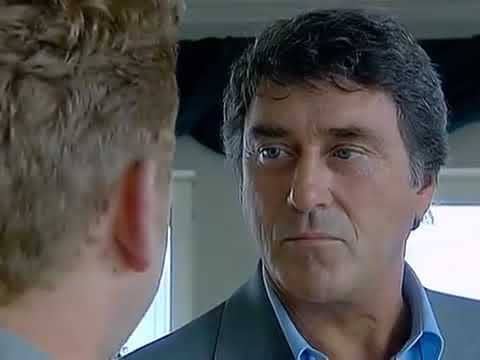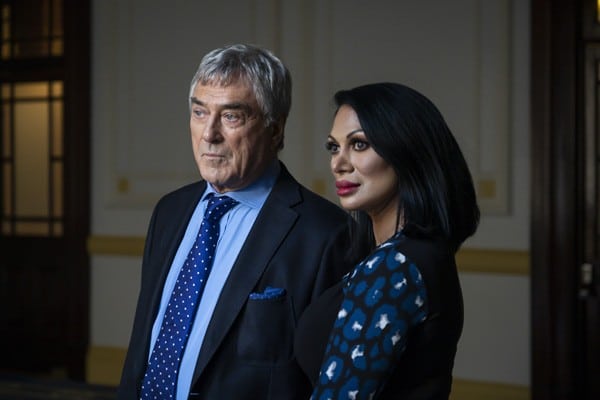Tom Jolliffe looks at the career of film and TV icon Billy Murray, who is still going strong…

With a career that has spanned close to 50 years, British legend Billy Murray has made a name for himself as not just a reliable on screen ne’er-do-well or police officer, but attained iconic status with two particularly popular roles. He may attest otherwise, but it seems like things aren’t slowing down, with Murray very much in demand. Now he’s coming back as the leading man in the crime thriller Nemesis (see our interview with producer Jonathan Sothcott here).
Murray, whose career was given a kick-start with a helping hand from the Krays no less (who paid tuition fees at the East 15 acting school), had his first big break in Ken Loach’s Poor Cow, starring alongside Terence Stamp. He had featured roles in Corruption (with Peter Cushing), Up The Junction (from Peter Collinson) and later the gritty British prison set drama McVicar, starring opposite Roger Daltrey and Adam Faith. He’d then become a regular face on British TV popping up in everything from The Sweeney to The Professionals, to Minder. There were some interesting diversions too, like Rock Follies, but his forte seemed to be cop shows on one side of the law or the other. Good looking, charismatic with an inimitable voice, a more front and center role was inevitable. It almost came with Only Fools and Horses. A more drama focused outline was replaced with the sitcom format that produced one of Britain’s most enduring comedies (and David Jason took the part of Del Boy). As it was, an iconic role would come in the form of D.S Don Beech in The Bill.

The iconic TV show ran for 27 years. It became a staple for households throughout, right up with the kind of audience grip some the most iconic soaps had (more on that later). As Beech, Murray was able to tread an interesting character path. A man of the law, a tough guy but also someone with a murkier side. Beech was the classic cop gone bad. His term at Sun Hill might not have been as long as some of the stalwarts there, but he played Beech for almost a decade (latterly returning in specials or guesting). That theme tune is legendary among British TV and the show still has plenty of nostalgic admirers (even some newer fans who pick it up on the endless repeats). Beech and his arc remains one of the shows biggest highlights (and one I personally recall more than most).
When you become so synonymous with a character on TV it can be difficult to shake that off and establish yourself in something new. Murray did that however, when he turned up in Albert Square on EastEnders. It’s a show that has been going for over 35 years and much of the continuing appeal of Walford’s residents and their misadventures has stemmed from a litany of memorable villains. The characters who create the drama, throw spanners in the works, whether it’s Dirty Den or Steve Owen. The square needs a wrongun. Someone charismatic, with a conflicting likeability. On paper Murray was a perfect candidate and in delivery, he most definitely brought the goods. Crossing paths with the likes of Peggy Mitchell (the late great Barbara Windsor) to rival gangsters, he was a magnet for the big storylines and the memorable moments (not least chucking rival Andy Hunter off a motorway bridge). With a successful stint in EastEnders comes a kind of popularity that seems to last. Long time fans of the show have a great fondness for those great characters. Where others might have slipped into obscurity, Johnny Allen did not.

His post soap work saw a shift back to film, but he stayed no less prolific, popping up in a number of indie British films like Stalker, Strippers vs Werewolves, Freight and also having a memorable part in the cult Rise of The Footsoldier franchise (with a new instalment in the offing with Murray again involved). He even had time to venture to Eastern Europe to co-star with Dolph Lundgren and Cuba Gooding Jr. in the solid actioner, One in The Chamber with Murray exuding as much star powered gravitas as his Hollywood co-stars. In fact there seemed some regularity for British actors venturing across Europe in a period where DTV action was eying the locals of Bulgaria or Romania with regularity. A lot of EastEnders contemporaries popped up opposite the likes of Jean-Claude Van Damme, Wesley Snipes and Steven Seagal in these actioners. Murray would mark one of the few who almost effortlessly matched the headliners for magnetism.
Now comes Nemesis, billed as a morally ambiguous thriller and throwback to classic British crime cinema. The film offers Murray centre stage, and an opportunity to exude that magnetic charisma. Interestingly, the film was born out of some of Murray’s own suggestions, along with a desire from producer Jonathan Sothcott, to give his long time collaborator and family friend the kind of project befitting of his talent. Certainly it worked, and Murray, even approaching 80, revels in being the headline act. The twinkle is still there, as is the complexity that allures the audience into liking a morally obtuse character. He’s also able to play brilliantly off Nick Moran (who is superb in the film), as two opposing forces collide again after years apart.

Audiences are still drawn to the Murray headliner. Early signs for Nemesis suggest a success, with the potential to have a lasting appeal given it flips up expectations. Maybe we’ll see Murray headlining once more, but we’ll undoubtedly see him. A return as Mickey Steele in the Footsoldier franchise aside, he’ll be dolling out some more revenge in the ensemble action film Renegades. Long may it continue.
Tom Jolliffe – https://www.instagram.com/jolliffeproductions/










